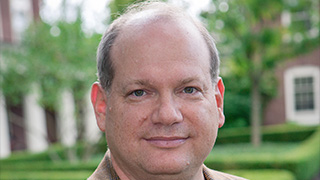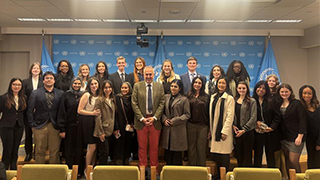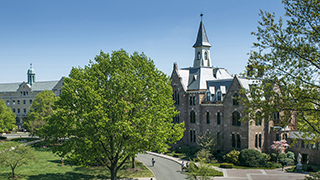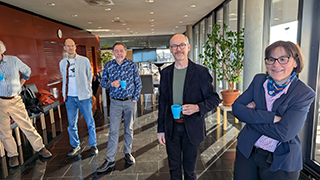Seton Hall to Partner With Schools on New Initiative to Support Children With Autism
Tuesday, June 18, 2024
 Seton Hall University is launching a new program to bolster support for students with
autism in public school programs in North Jersey. The Seton Hall Access & Resource
Clinic (SHARC) will bring together the expertise of the College of Human Development, Culture, and Media (CHDCM), the College of Nursing, and the School of Health and Medical Sciences in a comprehensive effort to address the needs of underserved communities. SHARC
will be strategically piloted within the Morris-Union Jointure Commission (MUJC),
a public school district formed by a combination of 30 school districts from Morris,
Union, Essex, Somerset and Hunterdon Counties, which serves students with autism at
their Developmental Learning Centers (DLC) locations in New Providence and Warren.
Seton Hall University is launching a new program to bolster support for students with
autism in public school programs in North Jersey. The Seton Hall Access & Resource
Clinic (SHARC) will bring together the expertise of the College of Human Development, Culture, and Media (CHDCM), the College of Nursing, and the School of Health and Medical Sciences in a comprehensive effort to address the needs of underserved communities. SHARC
will be strategically piloted within the Morris-Union Jointure Commission (MUJC),
a public school district formed by a combination of 30 school districts from Morris,
Union, Essex, Somerset and Hunterdon Counties, which serves students with autism at
their Developmental Learning Centers (DLC) locations in New Providence and Warren.
Seton Hall alumna Janet L. Fike, Ed.D./J.D., who serves as superintendent of the MUJC, is currently collaborating with CHDCM Dean Bryan Crable, Ph.D., and Interim Deans Kristi Stinson, Ph.D., R.N., A.P.N.-B.C.,(College of Nursing) and Vikram Dayalu, Ph.D., CCC-SLP, School of Health and Medical Sciences) to develop a pilot program to launch in 2025 at the MUJC’s Developmental Learning Centers.
"The MUJC is excited to participate with Seton Hall University as a committed partner to develop, enhance and expand educational, therapeutic, nursing and social services to our DLC students and their parents," said Fike. "By working with the expertise and research talent at Seton Hall, we can more fully address our students’ needs for a total continuum of services." She noted that the needs of DLC students are so expansive that they require a diversity of services.
She added, "SHARC is truly a win-win. Not only does our partnership offer authentic learning and internship experiences to its undergraduate and graduate students, it could also lead to a recruitment stream for the MUJC with employment opportunities for Seton Hall students."
Conceived as part of the University’s Academies initiative, SHARC intends to achieve several key objectives, including developing targeted programs and resources within the district to aid families of children with autism and collaborating with community partners to enhance and develop new programming options. Additionally, the initiative seeks to leverage technology to increase resource access and better support families within the district, while also offering a potential internship-to-hire model that benefits both the district and Seton Hall graduates.
SHARC is designed to foster a collaborative environment where Seton Hall students can gain valuable experiential and interdisciplinary learning opportunities. These opportunities are crafted to enhance professional development, promote team-based skills and practice integrated problem-solving in real-world scenarios.
"The collaboration among the three deans and their respective academic units is aimed at developing year-long programming that meets the broad spectrum of needs of students, families and schools in the region," stated Stinson. "This clinic is not only an innovation hub but also a training ground for the next generation of healthcare and educational professionals."
Upon the successful launch of SHARC, Seton Hall plans to extend the program’s reach by cultivating partnerships with other districts and is currently seeking additional funding to expand its impact. The expected outcomes include the formation of interdisciplinary teams from Seton Hall, completion of needs assessments, development of part-time and full-time experiential roles for students, and the creation of tailored programs and multimedia resources to support the clinic's activities.
"This partnership with the MUJC represents a significant step forward in supporting the educational and developmental needs of students with disabilities in our community and their families. We see it as a model of how academic institutions can play a pivotal role in community engagement and service," stated Crable.
"The SHARC program represents an innovative approach to integrating health sciences in a way that directly impacts the communities we serve," added Dayalu. "By engaging our students in this multidisciplinary setting, we not only enhance their learning but also provide essential services that can make a significant difference in the health outcomes for these children and their families. This is a prime example of how academic programs can effectively respond to societal needs through thoughtful and applied education."
Categories: Education






